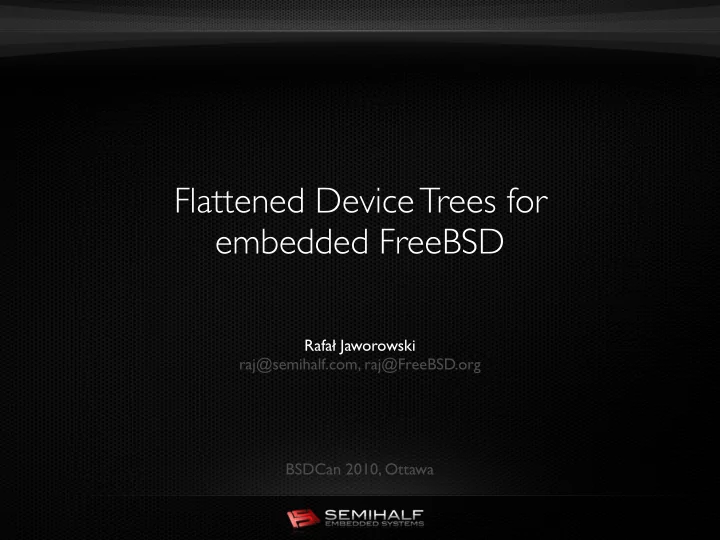

Flattened Device Trees for embedded FreeBSD Rafał Jaworowski raj@semihalf.com, raj@FreeBSD.org BSDCan 2010, Ottawa
Flattened Device Trees for embedded FreeBSD Presentation outline Introduction Integration of FDT with FreeBSD Tools, environment loader(8) kernel Using the FDT Current state summary ARM, PowerPC
Flattened Device Trees for embedded FreeBSD Introduction Problem Embedded systems vary greatly in the design, components interconnects and non-enumerable resources utilization Simple frmware / early stage bootloaders (typically no comprehensive and uniform data about hardware confguration delivered to the OS) Challenge: describe non-enumerable resources of a computer system in a portable way
Flattened Device Trees for embedded FreeBSD Introduction cont'd Examples Memory layout (offsets, ranges) Network MAC-PHY binding Interrupts hierarchy and IRQ lines routing GPIO / multi-purpose pin assignment I 2 C slave id (address) Current embedded FreeBSD approaches
Flattened Device Trees for embedded FreeBSD Why FDT? Flattened Device Tree overview Established and mature, independent of platform and architecture Embraced by the Power.org for the ePAPR specifcation Central idea inherited from Open Firmware (IEEE 1275) device-tree notion Does NOT require OF (or any other specifc frmware)
Flattened Device Trees for embedded FreeBSD FDT basics Hardware platform resources described in human readable text source format The source description is converted ( compiled ) into a binary object i.e. the fattened device tree The OS (kernel, drivers) learns about hardware resources from this blob without any a priori knowledge
Flattened Device Trees for embedded FreeBSD Terminology, defnitions Device Tree Source (DTS) Device Tree Blob (DTB) Big endian Device Tree Compiler (DTC) Bindings defnitions Content conventions Defne meaning of allowed values and their ranges Specifc to a particular node type
Flattened Device Trees for embedded FreeBSD DTS example ... cpus { #address-cells = <1>; #size-cells = <0>; PowerPC,8555@0 { device_type = "cpu"; reg = <0x0>; d-cache-line-size = <32>; // 32 bytes i-cache-line-size = <32>; // 32 bytes d-cache-size = <0x8000>; // L1, 32K i-cache-size = <0x8000>; // L1, 32K timebase-frequency = <0>; bus-frequency = <0>; clock-frequency = <0>; next-level-cache = <&L2>; }; }; memory { device_type = "memory"; reg = <0x0 0x8000000>; // 128M at 0x0 };
Flattened Device Trees for embedded FreeBSD DTS example cont'd soc8555@e0000000 { #address-cells = <1>; #size-cells = <1>; device_type = "soc"; compatible = "simple-bus"; ranges = <0x0 0xe0000000 0x100000>; bus-frequency = <0>; ... i2c@3000 { #address-cells = <1>; #size-cells = <0>; compatible = "fsl-i2c"; reg = <0x3000 0x100>; interrupts = <43 2>; interrupt-parent = <&mpic>; dfsrr; }; ... enet0: ethernet@24000 { #address-cells = <1>; #size-cells = <1>; device_type = "network"; model = "TSEC"; compatible = "gianfar"; reg = <0x24000 0x1000>; ranges = <0x0 0x24000 0x1000>; local-mac-address = [ 00 00 00 00 00 00 ]; interrupts = <29 2 30 2 34 2>; interrupt-parent = <&mpic>; tbi-handle = <&tbi0>; phy-handle = <&phy0>; }; ...
Flattened Device Trees for embedded FreeBSD Integrating FDT with FreeBSD Reuse of existing tools dtc package The device tree compiler utility: dtc Helper library: libfdt Compliancy with native FreeBSD interfaces and frameworks Baseline code, build environment FreeBSD 9-CURRENT (Nov 2009)
Flattened Device Trees for embedded FreeBSD Integration areas Build system WITH_FDT knob The dtc utility as a bootstrap tool loader(8) For platforms with regular booting environment Reusing libfdt FreeBSD kernel support Reusing libfdt
Flattened Device Trees for embedded FreeBSD Usage scenarios Stand-alone device tree blob Full FreeBSD booting set-up, using loader(8) FDT blob is stand-alone i.e. a physically separate fle Delivered to the kernel by loader(8) Statically embedded blob Simplifed booting environments, no loader(8) DTB is integral part of the kernel image fle Both cases: the DTB is prepared beforehand
Flattened Device Trees for embedded FreeBSD loader(8) extensions Leverage existing mechanisms The stand-alone DTB fle treated as yet another type of a raw binary kernel module Loaded and unloaded before kernel boot Dedicated fdt command Inspect and manipulate the loaded blob fdt cd <fdt_path> fdt header fdt ls [fdt_path] fdt mknode [fdt_path/]<node_name> fdt mkprop [node_path/]<property_name> <string | [ byte1 byte2 .. ] | <uint32_1 uint32_2 .. > > fdt prop [node_path/[prop_name value_to_set]] fdt pwd fdt rm [node_path/]<node_name | property_name>
Flattened Device Trees for embedded FreeBSD loader(8) examples loader> load -t dtb boot/mpc8555cds.dtb loader> lsmod ... 0x162f92c: boot/mpc8555cds.dtb (dtb, 0x1eb2) loader> loader> fdt header Flattened device tree header (0x162f92c): magic = 0xd00dfeed size = 7858 off_dt_struct = 0x00000038 loader> fdt prop /cpus/PowerPC,8572@0 off_dt_strings = 0x000018ac device_type = "cpu" off_mem_rsvmap = 0x00000028 reg = <0x00000000> version = 17 d-cache-line-size = <0x00000020> last compatible version = 16 i-cache-line-size = <0x00000020> boot_cpuid = 0 d-cache-size = <0x00008000> size_dt_strings = 518 i-cache-size = <0x00008000> size_dt_struct = 6260 timebase-frequency = <0x00000000> loader> bus-frequency = <0x23c34600> clock-frequency = <0x00000000> next-level-cache = <0x00000001> loader> fdt prop /cpus/PowerPC,8572@0/clock-frequency <15000000> loader> fdt prop /cpus/PowerPC,8572@0 ... clock-frequency = <0x00e4e1c0> ...
Flattened Device Trees for embedded FreeBSD loader(8) examples cont'd loader> fdt ls /aliases /cpus /cpus/PowerPC,8555@0 /memory /soc8555@e0000000 /soc8555@e0000000/ecm-law@0 /soc8555@e0000000/ecm@1000 /soc8555@e0000000/memory-controller@2000 /soc8555@e0000000/l2-cache-controller@20000 /soc8555@e0000000/i2c@3000 /soc8555@e0000000/dma@21300 /soc8555@e0000000/dma@21300/dma-channel@0 /soc8555@e0000000/dma@21300/dma-channel@80 /soc8555@e0000000/dma@21300/dma-channel@100 /soc8555@e0000000/dma@21300/dma-channel@180 /soc8555@e0000000/ethernet@24000 /soc8555@e0000000/ethernet@24000/mdio@520 /soc8555@e0000000/ethernet@24000/mdio@520/ethernet-phy@0 /soc8555@e0000000/ethernet@24000/mdio@520/ethernet-phy@1 /soc8555@e0000000/ethernet@24000/mdio@520/tbi-phy@11 /soc8555@e0000000/ethernet@25000 /soc8555@e0000000/ethernet@25000/mdio@520 /soc8555@e0000000/ethernet@25000/mdio@520/tbi-phy@11 /soc8555@e0000000/serial@4500 /soc8555@e0000000/serial@4600 /soc8555@e0000000/crypto@30000 /soc8555@e0000000/pic@40000 /soc8555@e0000000/cpm@919c0 /soc8555@e0000000/cpm@919c0/muram@80000 /soc8555@e0000000/cpm@919c0/muram@80000/data@0 /soc8555@e0000000/cpm@919c0/brg@919f0 /soc8555@e0000000/cpm@919c0/pic@90c00 /pci@e0008000 /pci@e0008000/i8259@19000 /pci@e0009000 loader>
Flattened Device Trees for embedded FreeBSD FreeBSD kernel and FDT Early system initialization Adapt to FDT-based approach Integration with existing Open Firmware framework Integration with FreeBSD native NEWBUS device drivers scheme Conversion of individual drivers to the new conventions
Flattened Device Trees for embedded FreeBSD FreeBSD Open Firmware infrastructure PowerPC (Apple), Sparc64 Genuine Open Firmware services Close relationship of FDT and OF device-tree Limited to device tree data retrieval OFW kernel interfaces OFW_* (low-level access to OF API calls) OFW_BUS_* (standard device node properties access, translation to NEWBUS device kernel objects)
Flattened Device Trees for embedded FreeBSD FDT as OFW provider Back-end implementation of OFW_* methods Device tree data retrieved from the DTB Using OFW_BUS_* by higher level FDT infrastructure Simplify node and properties management Client code sees FDT as genuine OF Only to the extent of device tree retrieval Other methods (device I/O, memory management etc.) not implemented and return error when called
Recommend
More recommend